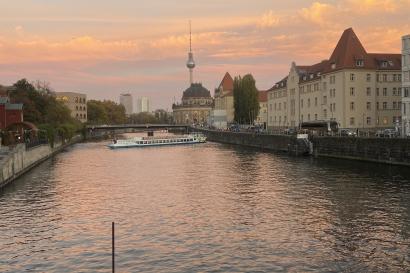I was prepared to face some cultural differences when I arrived in Germany. I’ve lived in Berlin before, during a high school exchange, I was more prepared for the apparent brusqueness of the city’s inhabitants and the entspannen Feirabends. There were a few things, however, that I’d either forgotten or hadn’t noticed before. So I’ve decided to compile the most significant of those in a list. Some of them may be useful for anyone traveling in Berlin or Germany and some of them are simply observations. All of them are hopefully amusing to read.
Skip the "How are you?"s
There is no quicker way to mark yourself as an outsider in Germany than by being overly polite. There is no empty and automatic hello, a simple good morning is more than enough. And it’s true what they say about Germans not engaging in small talk. The weather isn’t a topic of conversation when you’re buying your coffee or checking out for groceries. Sometimes I slip and ask the cashier “Wie gehts?” (how are you) and quickly realize my mistake when the cashier gives me a bemused look, laughing a little as they answer and take in my apparent otherness. They aren’t offended, just amused that I’ve assumed this level of familiarity with them. “Gut, und dir?” Their apparent amusement deepens as I mutter my embarrassed response. In those moments I know, no matter how good my accent is, I am at that moment very much a stranger in their land. Even with friends, the how are yous are reserved only for meetings after a while apart. Asking how you are in Germany is asking for an inventory of your friends' lives, what’s been keeping them happy recently, and what’s been bothering them. In berlin asking ‘how's it going every time you see each other is unnecessary and insincere.
Company over activity
With the obligatory and obvious disclaimer that this may not be a universally applicable statement, I’ve noticed that German friendships seem to be less activity-oriented than American ones. Instead of texting:
“Wanna go to brunch this week? Or see that new museum exhibit? Or go mini-golfing at that pop-up glow-in-the-dark golf course we saw an advertisement for last month?”
My German friends send me voice messages saying,
“Hallo liebe Eliza, willst du heute Abend zu mir kommen und etwas zusammen kochen?” (Translation: Hello darling Eliza, wanna come over to cook something at my place tonight?)
Instead of hundreds spent on fancy birthday dinners, most of my friends’ birthdays have taken place in one of the many parks that populate Berlin. The food is usually homemade cakes accompanied by salads bought at the grocery store. It seems that most things done here are for the sake of the company, rather than the activity itself. A night in has just as much value as a night out, as long as you’re spending time together.
Smoking Culture
I grew up in a small town in Colorado and I go to school in D.C. so I’m no stranger to the warm smell of tobacco, the tangy stench of weed, or the cloyingly sweet smell borne back on clouds of e-cigarette smoke. Still, nothing prepared me for the smoking culture in Berlin. While smoking in the U.S. is widespread, there are social norms which delegate it to certain areas and prohibit it completely in most public indoor spaces. Not the case in Berlin. People don’t just smoke on corners or huddled under overhangs. Bars on a friday are shrouded in cigarette smoke and clubs are intermittently lit by the orange glow of cigarette tips. Even though I don’t smoke, coming home from a night out the smell of cigarettes clings to my clothes, my hair, even my skin. Even though I’ve always claimed to hate the smell of cigarettes, I’m learning to love it. Cigarette smoke is slowly becoming connected to the smell of a night out with good friends or an adventure shared. While I’m sure I won’t miss smoking bars when I return to the U.S., I’m sure the smell of cigarettes clinging to my clothes will always remind me of Berlin.
Line Culture
Twenty minutes? Well, that’s really rather. Two hours with no guarantee that you’ll be even admitted to the club? Buy some beers for the wait. In Berlin, particularly at the clubs, waiting in line for insane amounts of time is not considered the same hindrance that it is in America. There seems to be generally a rush to get places, perhaps because there are just so many options here that there truly is no need to worry about your time. Standing in line can even be an event in itself with people occasionally creating a side hustle out buying cases of beer and walking down line selling beers. I also think people are more willing to be patient because Berlin’s concept of time is simply different from most American cities. I doubt even New York, the city that never sleeps, views 2 a.m. as the beginning of the night in the same way that Berlin seems to. However, I still can’t convince myself that standing in any line that reaches around two blocks is really worth it. I guess in some ways I remain stubbornly American.
Shelf life
One thing that has been a truly shocking comparison between Berlin and America so far has been the shelf life of my produce. In the first weeks, I found myself throwing out what I had thought would be at least a week’s worth of food simply because of how quickly it began to show signs of decay. It wasn’t just that I was buying for one person rather than my family, food was actually going bad quicker than I was used to. This realization has lent itself to a mounting horror as it forced me to recognize just how many more chemicals the Food Drug Administration in the U.S. allows into our food. I mean, it's one thing to know that European countries have banned 1,289 more chemicals than the U.S. has but it's an entirely different and more horrible thing to see it in action. It’s certainly made me wonder what exactly is so drastically extending the shelf life of my spinach back home.
Trained Dogs
In general, dogs in Berlin are shockingly well-trained. Instead of tugging against leashes as they zigzag across the sidewalk, most Berlin dogs walk ahead of their owners, unleashed. They barely stop even to sniff the undoubtedly fascinating stains on the sidewalks, instead trotting determinedly ahead as if they know exactly where they are going. They pause only occasionally to look over their shoulders, to assure themselves that their owner is still safely in tow. Most often, it seems like they’re leading their owner somewhere, not the other way around. There is genuinely nothing cuter than seeing a dog trot happily ahead of its owner, looking backward as if to call “Aren’t you coming?” I, for one, can’t help but wonder what training program Berliners have to make their pups so generally well-behaved.
The one disadvantage of this adorable independence is it makes petting strange dogs on the street very difficult. For one thing, the owner is usually just far enough away to make requesting to pet the dog slightly awkward (especially in your second language) but the biggest problem is that the dogs themselves pass too quickly for me to even attempt to say hello. Instead of being able to pet the puppies as I pass, I’ve been reduced to wistful stares as they pass me by, tails proudly in the air.

Eliza Dubose
Hello everyone! My name is Eliza DuBose and I'm from the area surrounding Boulder, Colorado. I'm a junior at American University studying Foreign Language and Communication Media, which is (very) basically a Journalism and German double major. This is my second time living in Germany and I am so thrilled to be studying in Berlin for the year. In my free time, I spend most of my time hiking, reading, writing, or consuming an inordinate amount of media.








